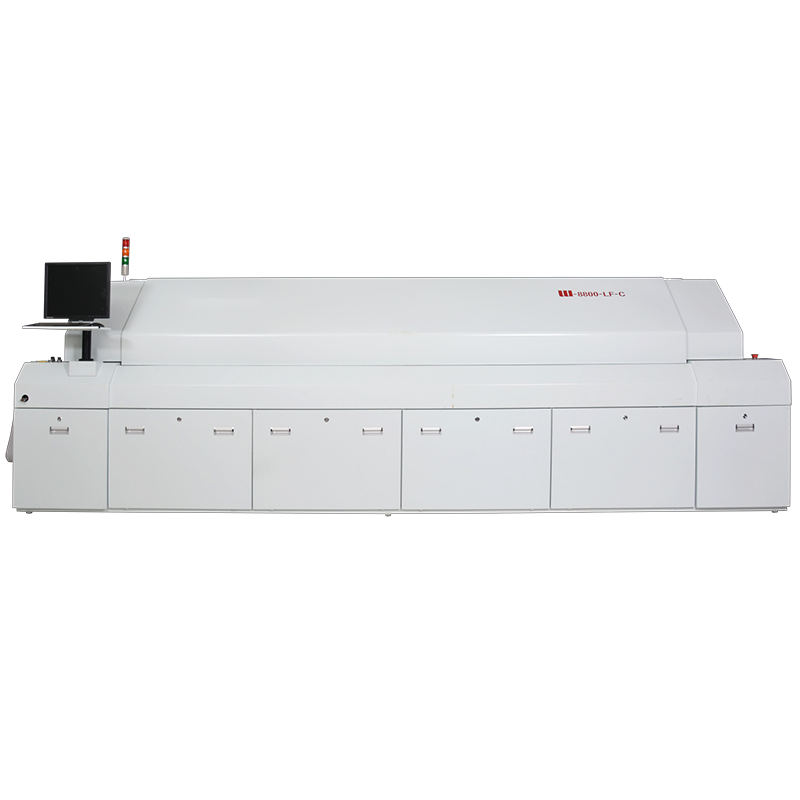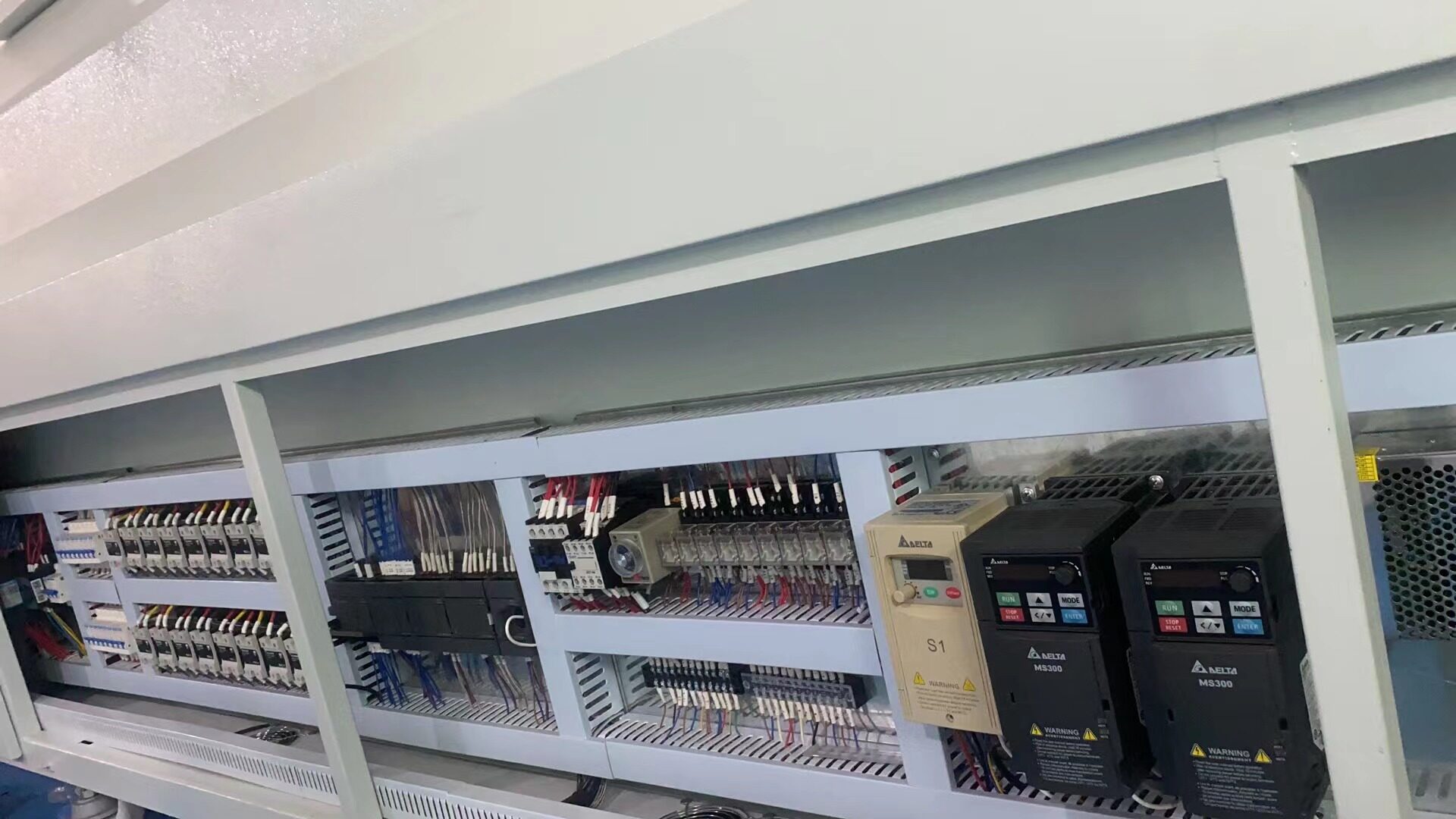メールフォーマットエラー
emailCannotEmpty
emailDoesExist
pwdLetterLimtTip
inconsistentPwd
pwdLetterLimtTip
inconsistentPwd


China SMT Reflow Oven: The Ultimate Guide
The SMT reflow oven plays a crucial role in the assembly process in the world of electronic manufacturing. As a key piece of equipment, the China SMT reflow oven is known for its efficiency and reliability. In this comprehensive guide, we will explore everything you need to know about the China SMT reflow oven, from its features and benefits to tips for choosing the right one for your production line.
Understanding the SMT Reflow Process
The Surface Mount Technology (SMT) reflow process is a critical step in the assembly of electronic components onto printed circuit boards (PCBs). This process involves the use of a reflow oven to heat the solder paste, causing it to melt and form a strong bond between the components and the PCB.
Solder Paste Application: Before the components are placed on the PCB, solder paste is applied to the pads where the components will be soldered. The solder paste is a mixture of solder alloy and flux, which helps to clean the surfaces and promote solder wetting.
Component Placement: Once the solder paste is applied, the components are placed onto the PCB using pick-and-place machines. The components are positioned precisely on the pads according to the design of the circuit board.
Reflow Oven Heating: The PCB with the components and solder paste is then passed through the reflow oven. The oven is divided into multiple heating zones, each with its own temperature profile. The PCB moves through these zones on a conveyor belt, gradually heating up to the reflow temperature.
Reflow Soldering: As the PCB moves through the reflow oven, the solder paste melts and reflows, forming a strong bond between the components and the PCB. The flux in the solder paste helps to remove any oxides and contaminants, ensuring a clean and reliable solder joint.
Cooling Zone: After the reflow process is complete, the PCB enters a cooling zone in the reflow oven. Here, the PCB is gradually cooled down to solidify the solder joints and prevent component damage.
Inspection and Testing: Once the PCB has been through the reflow process, it is inspected for any defects or soldering issues. Automated optical inspection (AOI) and X-ray inspection are commonly used to check for solder joint quality and component placement accuracy.
Features of the China SMT Reflow Oven
The China SMT reflow oven is designed with a range of features that make it a top choice for electronics manufacturers. Some of the key features include:
Precise Temperature Control: The oven offers precise temperature control, ensuring that the solder paste is heated to the optimal temperature for a reliable bond.
Uniform Heating: The oven is equipped with multiple heating zones to ensure uniform heating across the entire PCB, preventing component damage and ensuring consistent solder joints.
Conveyor System: The conveyor system in the China's oven allows for smooth and efficient PCB transportation through the heating zones, maximizing throughput and productivity.
User-Friendly Interface: The oven is designed with a user-friendly interface that allows operators to easily program and monitor the reflow process.
Benefits of Using a China SMT Reflow Oven
There are several benefits to using a China SMT reflow oven in your electronics manufacturing process. Some of the key benefits include:
Improved Solder Joint Quality: The precise temperature control and uniform heating result in high-quality solder joints that are strong and reliable.
Increased Productivity: The efficient conveyor system and user-friendly interface of the oven help to streamline the reflow process, increasing productivity and reducing production time.
Cost-Effective Solution: The China's reflow oven offers a cost-effective solution for electronics manufacturers, providing high-quality results at a competitive price point.
Choosing the Right China SMT Reflow Oven
Choosing the right China SMT reflow oven is a crucial decision for electronics manufacturers looking to optimize their reflow soldering processes. With a wide range of options available on the market, it’s essential to consider several key factors to ensure that you select the best oven for your specific production requirements. Here are some important considerations to keep in mind when choosing a SMT reflow oven:
Production Volume: One of the first factors to consider when selecting a China SMT reflow oven is your production volume. The size and throughput capacity of the oven should align with the number of PCBs you plan to process. If you have high-volume production requirements, you may need a larger oven with multiple heating zones to accommodate a higher throughput.
Budget: Determine your budget for purchasing a SMT reflow oven and consider the cost-effectiveness of different models. While it’s essential to invest in a high-quality oven that meets your production needs, it’s also important to find a balance between cost and performance. Compare the features and capabilities of various ovens to find one that offers the best value for your investment.
Technical Specifications: Review the technical specifications of the SMT reflow oven to ensure that it meets your production requirements. Consider factors such as temperature range, heating zones, conveyor speed, and overall performance capabilities. Make sure that the oven’s specifications align with the types of PCBs you will be processing and the soldering profiles you need to achieve.
Energy Efficiency: Look for a SMT reflow oven that is designed with energy-efficient features to help reduce operating costs and environmental impact. Energy-efficient ovens may include insulated chambers, efficient heating elements, and programmable power-saving modes that can help minimize energy consumption while maintaining optimal performance. Choosing an energy-efficient oven can lead to long-term cost savings and sustainability benefits.
Reliability and Support: Consider the reputation of the manufacturer and the level of customer support available for the SMT reflow oven. Look for a reputable manufacturer with a track record of producing high-quality equipment and providing reliable customer service. A reliable oven with responsive technical support can help minimize downtime and ensure smooth operation of your production line.
Conclusion
In conclusion, the China SMT reflow oven is a reliable and efficient solution for electronics manufacturers looking to achieve high-quality solder joints and increased productivity. With its advanced features and user-friendly interface, the China SMT reflow oven is a valuable asset for any production line. By understanding the reflow process, exploring the features and benefits of the oven, and considering key factors when choosing the right model, you can optimize your electronics manufacturing process and achieve superior results.

